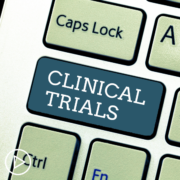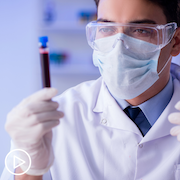Newly Diagnosed Non-Small Cell Lung Cancer | Key Advice for Patients
Newly Diagnosed Non-Small Cell Lung Cancer | Key Advice for Patients from Patient Empowerment Network on Vimeo.
What’s key advice for newly diagnosed non-small cell lung cancer (NSCLC) patients? Expert Dr. Christina Baik from Fred Hutchinson Cancer Center discusses genetic testing, essentials to know about your lung cancer, and patient tips to ensure your best care.
See More from START HERE Lung Cancer
Related Resources:

|

Advancing Lung Cancer Treatment: Bridging the Gap in Personalized Care |

Understanding Oncogene-Driven Lung Cancer: Targeted Therapy Advances and Challenges |
Transcript:
Lisa Hatfield:
When a patient is diagnosed with non-small cell lung cancer, is genetic testing always done on the tumor, or do patients know what their mutations are right upon diagnosis if testing is done?
Dr. Christina Baik:
So, as a rule of thumb, they should, all patients should be tested, and there are exceptions. So, for example, in lung cancer, there’s the type that we call small cell lung cancer, and there’s non-small cell lung cancer. So we often, we usually do not do genetic testing on small cell lung cancer, because often these tumors do not have a genetic abnormality that for which we can actually give treatment for. But for non-small cell patients, I would say, if most, my personal opinion is that everybody should be tested with the genetic test and really advocate for that. You know, there are certain types of non-small cell lung cancer where there are genetic targets that are rare, however, you don’t know unless you test. So I would say yes to that question of testing for genetic abnormalities.
Lisa Hatfield:
Okay, thank you. So can you speak to the priorities for newly diagnosed patients, particularly populations who may have poor outcomes?
Dr. Christina Baik:
So, I think there are priorities when it comes to research, and then there are priorities for individual patients, right? So from a research standpoint, as I mentioned before, I think really the priorities, the priority is to develop strategies so that we’re truly personalizing treatment for each patient, and we’re not giving this kind of generic treatment for a bulk of the patients. So from a research standpoint, really understanding the biology, understanding what works for what patient, I think that’s extremely important.
On the individual patient level, we sort of alluded to this earlier, but really knowing the cancer we’re dealing with is extremely important. Know your cancer stage, ask what your cancer stage is, know the type of lung cancer that you have. So I will say as of now, there are, I can think of 12 or 13 different types of lung cancer that I want to make sure I know that patients, you know, what their subtype is.
So know your subtype of lung cancer. Ask those questions. If the knowledge is not known, if they say, “You know your stage is not very clear, your subtype is not clear,” then ask why that is, what type of additional testing that needs to be done. So I think those are the type of questions that each patient and their family member should really ask. And in terms of the poor outcome question, I think the first thing I would say is if a doctor tells you, you belong to a group of patients who are going to have a poor prognosis, then ask why that is, right? And understand the reasons for that.
And if that’s, once you understand, I think I’m a big proponent of getting second opinions, because a lot of these treatments and there’s a lot of medical judgment involved when we recommend treatments, and you just want to get a different perspective with the same type or set of information. So really being an advocate for yourself, I think that’s extremely important when you’re first diagnosed.
Lisa Hatfield:
Great, thank you. You mentioned two things I also feel strongly about, I don’t have lung cancer, I have a different type of cancer, but you said that patients and family members can ask questions. Having an advocate with you at all times, if that’s possible, a family member, a friend going with you, I think is super important.
And also getting a second consult to understand your diagnosis better. I appreciate you saying that, because some of us are a little bit reluctant to do that, maybe afraid of offending our doctors. So, I appreciate that as a patient myself, so thank you. Okay. So talking about disease progression and recurrence, particularly for metastatic non-small cell lung cancer, what should patients know?
Dr. Christina Baik:
Okay. So when a cancer initially responds to a treatment and it stops responding, there can be many reasons for that. So the first question to really think about is is there another test we can do to identify the reason for the progression? And can we personalize a treatment according to that resistance pattern or the change that occurs in the tumor? This is more relevant to patients who get a targeted therapy, but I think it’s a good sort of rule of thumb in terms of asking your doctor why that is, and is there more testing that’s required?
And the second I would say is once the cancer progresses after the initial treatment, then, unfortunately, in lung cancer the treatment options are much more limited, and the effectiveness is very limited as well. So, it’s really at that juncture to really seek out clinical trials. There are many trials that are out there. So really working with your doctor in identifying these trials. If there is an academic center that’s close to you, at least inquiring about that. In lung cancer, fortunately, there are many wonderful advocacy groups and these advocacy groups can be great resources in finding out about clinical trials and where to seek out opinions. So, I think it does require some homework at the time of progression but really seek those out.
Lisa Hatfield:
Okay. Thank you. Now, if a patient does have an interest in a clinical trial, say maybe they have, their cancer has progressed, would they seek out that trial through the academic center itself? If, say they live in a rural area and they don’t have access, would they contact the academic center itself, or would they seek out a specialist like you first to ask about those clinical trials?
Dr. Christina Baik:
So they sort of come together in a way, because a lot of the specialists are in academic centers. So I think there are two ways to go about it. One is to meet with the specialist who can give you kind of the landscape of where things are and what might be appropriate. So, that’s one way to do it. The other way to do it is if there’s a particular clinical trial that you’re really interested in based on discussions with other patients or through advocacy groups, if there are particular clinical trials, usually the contact information is listed on the clinicaltrials.gov website, and the contact number is usually for the research team who can give you more information about that particular trial.
Lisa Hatfield:
Okay. That’s very helpful, thank you. And thank you for this overview. I just want to recap a couple of points that you made that’s really important for patients to know. You had mentioned knowing their type, their subtype of lung cancer, knowing their stage, and knowing their mutations and having an advocate. I think those are all really great tips that you gave.
Share Your Feedback
Create your own user feedback survey









